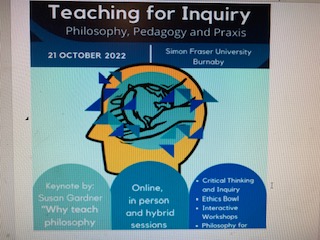Div. 6 Parents,
In the second term overview that is about to go home with the recent report card, I mentioned that this term, the students had been involved in dialogical learning/Philosophical Discussions to enhance Critical and Reflective thinking (Core Competencies). I used this approach in our Friendship Unit, using three anchor picture books as a jumping-off point to reflective discussions. Below you will find some links to videos and some information about this approach that, as an educator, I found compelling and grounded. I ‘listened to learn’ and found the students’ perspectives, as they discussed their opinions and thoughts, engaging.
For me, the journey started on the October pro-d day this year:
Presenter:
“Why Teach Philosophy for Children”, Dr. Susan T. Gardner (Capilano University)

And, just in case you’re thinking what I was thinking, “this all seems a bit high brow for young kids”, I came across a video (link below) that captured my imagination and made the teaching approach and reason for it, relatable. The magic in the video isn’t in the adult speakers-it’s in watching the clips of the young children, in class, as they discussed the picture books presented to them.
I also found this Ted Talk: Dr. Sara Goering: Philosophy for Kids: “Sparking a Love of Learning” very helpful in understanding the importance of discussion, dialogue, and philosophy in the development of critical thinking skills.
Goals of Philosophy with kids:
- Enhance Cognitive Skills, critical thinking,
- Learn to Build an argument
- Evaluate an argument using logic
- How to Respond to objections to their positions
- Think Creatively
- Behavioural Skills: converse with peers, listen to them carefully, take them seriously, and disagree with them without fighting or feeling hurt
- Philosophical Skills: think for themselves, realize that questions matter, language and literacy Dr. Sara Goering
“Dialogic teaching harnesses the power of talk to stimulate and extend pupils’ thinking and advance their learning and understanding. Robin Alexander
There it is in a nutshell. The three books we used had endless possibilities for perspective-taking, questioning, inferencing, and overall wonderful discussions. The simplicity of the titles can be deceiving. These books were layered with the complexity of human nature. “Norman Didn’t Do It! (Yes, He Did)” by Ryan T. Higgins, “How to Apologize” by David LaRochelle, and “I Can Help” by Reem Faruqi.